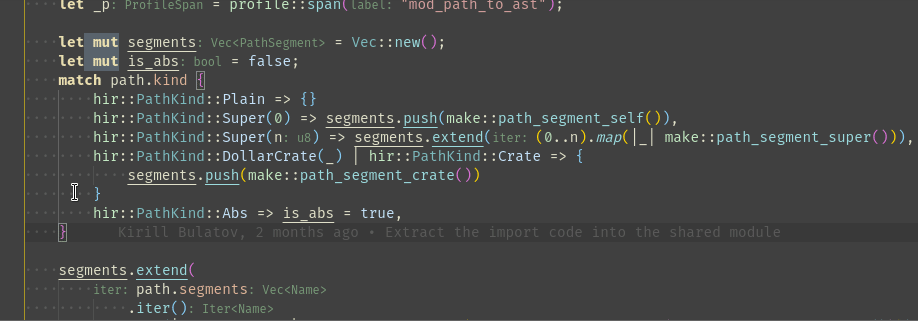7562: add `generate_enum_match` assist r=matklad a=yoshuawuyts
This adds a `generate_enum_match` assist, which generates `is_` variants for enums (e.g. `Option::{is_none,is_some}` in std). This is my first attempt at contributing to Rust-Analyzer, so I'm not sure if I've gotten everything right. Thanks!
## Example
**Input**
```rust
pub(crate) enum Variant {
Undefined,
Minor, // cursor here
Major,
}
```
**Output**
```rust
pub(crate) enum Variant {
Undefined,
Minor,
Major,
}
impl Variant {
pub(crate) fn is_minor(&self) -> bool {
matches!(self, Self::Minor)
}
}
```
## Future Directions
I made this as a stepping stone for some of the more involved refactors (e.g. #5944). I'm not sure yet how to create, use, and test `window.showQuickPick`-based asssists in RA. But once that's possible, it'd probably be nice to be able to generate match methods in bulk through the quickpick UI rather than one-by-one:
```
[x] Select enum members to generate methods for. (3 selected) [ OK ]
---------------------------------------------------------------------------
[x] Undefined
[x] Minor
[x] Major
```
Co-authored-by: Yoshua Wuyts <yoshuawuyts+github@gmail.com>
Co-authored-by: Yoshua Wuyts <yoshuawuyts@gmail.com>
7535: Extract function assist r=cpud36 a=cpud36
This PR adds `extract function/method` assist. closes#5409.
# Supported features
Assist should support extracting from expressions(`1`, `2 + 2`, `loop { }`) and from a series of statements, e.g.:
```rust
foo();
$0bar();
baz();$0
quix();
```
Assist also supports extracting parameters, like:
```rust
fn foo() -> i32 {
let n = 1;
$0n + 1$0
}
// -
fn foo() -> i32 {
let n = 1;
fun_name(n)
}
fn fun_name(n: i32) -> i32 {
n + 1
}
```
Extracting methods also generally works.
Assist allows referencing outer variables, both mutably and immutably, and handles handles access to variables local to extracted function:
```rust
fn foo() {
let mut n = 1;
let mut m = 2;
let mut moved_v = Vec::new();
let mut ref_mut_v = Vec::new();
$0
n += 1;
let k = 1;
moved_v.push(n);
let r = &mut m;
ref_mut_v.push(*r);
let h = 3;
$0
n = ref_mut_v.len() + k;
n -= h + m;
}
// -
fn foo() {
let mut n = 1;
let mut m = 2;
let mut moved_v = Vec::new();
let mut ref_mut_v = Vec::new();
let (k, h) = fun_name(&mut n, moved_v, &mut m, &mut ref_mut_v);
n = ref_mut_v.len() + k;
n -= h + m;
}
fn fun_name(n: &mut i32, mut moved_v: Vec<i32>, m: &mut i32, ref_mut_v: &mut Vec<i32>) -> (i32, i32) {
*n += 1;
let k = 1;
moved_v.push(*n);
let r = m;
ref_mut_v.push(*r);
let h = 3;
(k, h)
}
```
So we handle both input and output paramters
# Showcase




# Working with non-`Copy` types
Consider the following example:
```rust
fn foo() {
let v = Vec::new();
$0
let n = v.len();
$0
let is_empty = v.is_empty();
}
```
`v` must be a parameter to extracted function.
The question is, what type should it have.
It could be `v: Vec<i32>`, or `v: &Vec<i32>`.
The former is incorrect for `Vec<i32>`, but the later is silly for `i32`.
To resolve this we need to know if the type implements `Copy` trait.
I didn't find any api available from assists to query this.
`hir_ty::method_resolution::implements` seems relevant, but is isn't publicly re-exported from `hir`.
# Star(`*`) token and pointer dereference
If I understand correctly, in order to create expression like `*p`, one should use `ast::make::expr_prefix(T![*], ...)`, which
in turn calls `token(T![*])`.
`token` does not have star in `tokens::SOURCE_FILE`, so this panics.
I had to add `*` to `SOURCE_FILE` to make it work.
Correct me if this is not intended way to do this.
# Lowering access `value -> mut ref -> shared ref`
Consider the following example:
```rust
fn foo() {
let v = Vec::new();
$0 let n = v.len(); $0
}
```
`v` is not used after extracted function body, so both `v: &Vec<i32>` and `v: Vec<i32>` would work.
Currently the later would be chosen.
We can however check the body of extracted function and conclude that `v: &Vec<i32>` is sufficient.
Using `v: &Vec<i32>`(that is a minimal required access level) might be a better default.
I am unsure.
# Cleanup
The assist seems to be reasonably handling most of common cases.
If there are no concerns with code it produces(i.e. with test cases), I will start cleaning up
[edit]
added showcase
Co-authored-by: Vladyslav Katasonov <cpud47@gmail.com>
there are a few currently limitations:
* no modifications of function body
* does not handle mutability and references
* no method support
* may produce incorrect results
7310: Add assist: add lifetime to type r=matklad a=bnjjj
close#7200
7395: Obtain `ModuleId`'s `DefMap` through a method r=jonas-schievink a=jonas-schievink
Once `ModuleId` can represent modules inside block expressions, this will be required in order to obtain the correct `DefMap`. Otherwise existing code might use a `LocalModuleId` from the wrong `DefMap` and cause a panic.
bors r+
Co-authored-by: Benjamin Coenen <5719034+bnjjj@users.noreply.github.com>
Co-authored-by: Jonas Schievink <jonasschievink@gmail.com>
7291: Wrap remaining self/super/crate in Name{Ref} r=matklad a=Veykril
That should be the remaining special casing for `self` 🎉
Co-authored-by: Lukas Wirth <lukastw97@gmail.com>